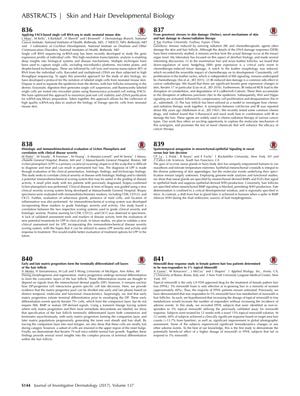Histologic and Immunohistochemical Evaluation of Lichen Planopilaris and Correlation with Clinical Disease Severity
April 2017
in “
Journal of Investigative Dermatology
”

TLDR The study found a link between the severity of Lichen Planopilaris seen by doctors and the details seen under a microscope, and created a new way to measure this severity.
The document presents a small pilot study that aimed to correlate clinical severity of Lichen Planopilaris (LPP), a primary cicatricial alopecia, with histologic findings and to develop an immunohistochemical scoring system for grading disease activity. The study included ten patients with biopsy-confirmed LPP. Clinical disease severity at the time of biopsy was graded using a new scoring system developed at Massachusetts General Hospital. Biopsy specimens were evaluated using immunohistochemistry markers CD8, CD123, and CK15, as well as assessing sebaceous glands, presence of mast cells, and location of inflammation. The study found a correlation between the clinical severity scoring system and the histologic severity. The immunohistochemical scoring system developed could potentially be used to assess LPP severity and response to treatment, which may improve the evaluation of treatment options for LPP in clinical trials.

